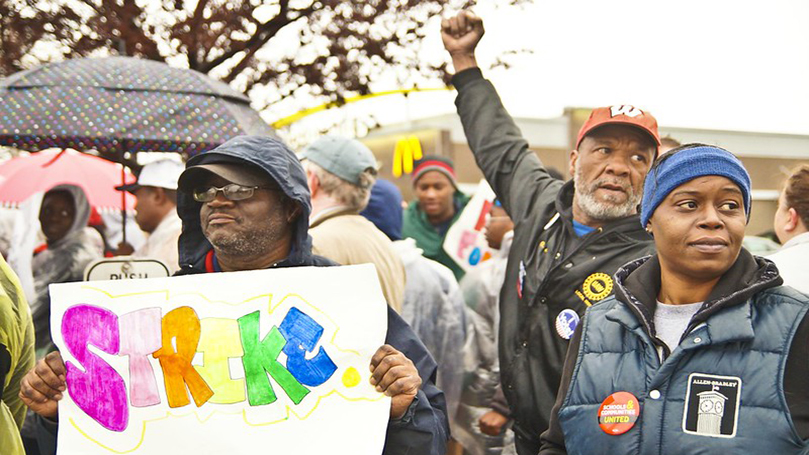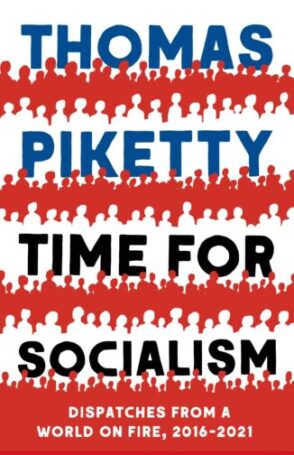
Thomas Piketty has a new collection of essays, entitled, Time for Socialism: Dispatches from a World on Fire, 2016–2021.
It is not possible to overstate the positive impact that the French author’s masterwork, Capital in the 21st Century, has had on the economics profession. The book, and the massive data collection projects on global and national inequalities that were enlarged by the debates it engendered, re-opened the doors to “socialism” in post–Cold War Western economics literature.
Comparisons to Karl Marx were inevitable, and sales of Marx’s own Capital leaped forward, too. Piketty demurred these associations with the comment, “I have not really read much Marx.”
At the time, the remark did not seem credible. I thought he was being coy, serving up a tease to the Left, but trying to keep the discussion on himself, not Marx. However, my sorely-missed friend and comrade Art Perlo once told me, “Maybe he was telling the truth, John.” Ahem.
Piketty’s new essay on socialism opens this collection. It lays out an ambitious and well-argued program for taxation, wealth redistribution, public investment, internationalism, education, science, and gender and racial equality within a social-democratic framework where, by redistributing property via democratic means, “we can help to redefine the whole set of relations of power and social domination.”
He further opens:
On the basis of the historical elements at my disposal, the ideal society seems to me to be one where everyone would own a few hundred thousand euros, where a few people would perhaps own a few million, but where the higher holdings (several tens or hundreds of millions, and a fortiori several billions) would only be temporary and would quickly be brought down by the tax system to more rational and socially more useful levels.
From my point of view, this is an entirely appealing, data-supported, doctor-approved version of Harry McClintock’s 1923 song “Big Rock Candy Mountain.” Here is the most memorable verse:
In the Big Rock Candy Mountains,
There’s a land that’s fair and bright,
Where the handouts grow on bushes
And you sleep out every night.
Where the boxcars all are empty,
And the sun shines every day
On the birds and the bees
And the cigarette trees,
The lemonade springs
Where the bluebird sings
In the Big Rock Candy Mountains!
There are economic and political problems with “cigarette tree socialism.”
There is no mention of class struggle in Piketty’s Time for Socialism. There is no mention of enforcing “peaceful co-existence” in his version of internationalism. Imperialism is no longer worth mentioning, even in the midst of NATO expansion toward Russia, ballooning military budgets, and a new Cold War with China.
 There is no agency to fight for and win Piketty’s “socialism,” such as a particular coalition of class, ethnic, or cultural forces or political parties—no force that could bring a regime of “participatory socialism” to power. Class is barely mentioned.
There is no agency to fight for and win Piketty’s “socialism,” such as a particular coalition of class, ethnic, or cultural forces or political parties—no force that could bring a regime of “participatory socialism” to power. Class is barely mentioned.
Existing socialist countries are disdained by Piketty for not being sufficiently democratic—in the bourgeois sense of permitting wealth to participate “freely” as a political franchise.
Market socialism is the goal for him, but not like that practiced in China, where the performance of the government is measured more by the results it delivers than by an ideal of “free and fair elections” in an environment of widely disparate wealth, and where the strategic concept of leadership is based on non-bourgeois forces seizing and dominating the “commanding heights of the economy” to preserve the public interest from the powers of capital.
Oh, and Piketty’s socialism is never to be like the “absolute failure” of Soviet socialism—which nonetheless helped liberate Piketty’s country from existence as an occupied German province.
Piketty’s path to socialism is to “rethink” everything. To give internationalism a chance again, he says, “we need to turn our backs on the ideology of absolute free trade . . . and . . . put in place an alternative economic system, a model of development based on explicit and verifiable principles of economic, fiscal, and environmental justice.”
There is no strategy. Only reason, the “Big Rock Candy Mountain,” and a long list of “anti-capitalist” critiques.
There are deep ironies in Piketty’s socialism, which I tend to think of as shamefaced socialism. His first book gained fame for finding a mathematical expression that captured capital’s tendencies to concentrate both economic and political-institutional power, thereby undermining its attachment to democratic ideals that first freed it from the pockets of monarchs and Popes.
The formula has held up well as researchers on inequality gathered more and more data across the world. The logical inference of the formula is that capitalism cannot “fix itself,” except by taxing itself, which it has absolutely no incentive to do. Piketty’s political stance seems in conflict with his own math.
Unfortunately, nothing I have said here is very original. The contents of Piketty’s “socialism,” and its internal contradictions and somewhat comedic “footlessness,” have been played as cards many times both against and alongside, its more class-conscious and revolutionary brethren in the democratic and socialist revolutionary movements and parties.
His particular version is presented as economically feasible but is strikingly similar to the socialisms of Eduard Bernstein, Karl Kautsky, Norman Thomas, Peter Kropotkin, Robert Owen, and many more who interpreted Marx’s proposition of a law-governed path of development that gave rise to capitalism and foretold its eventual replacement as meaning the revolutionary path was not required.
The revolutionaries share many values with the reformers but differ primarily in one, but historically decisive, respect. They criticize idealizing democracy in the midst of great inequality as a great illusion for working classes—unless it inspires them to realize that they are better guarantors and leaders of social progress than are dying ruling classes.
It matters little whether the dying regime be slave owners, fascists, or even liberal trillionaires. If their inability to reconcile conflicts of interest prevails, Piketty’s own math argues capitalism is very unlikely to “fix itself,” nor save the countries where it prevails from catastrophes of failing states.
The revolutionaries are well known. None of them started out in life as such, but all acquired a good nose for regimes that are not sustainable: Marx, Lenin, Mao, Ho Chi Minh, Fidel Castro, Nelson Mandela, George Washington, Thomas Paine, Abraham Lincoln, Frederick Douglass, Ulysses Grant, Gandhi, the Bolshevik CIO organizers, Dr. Martin Luther King Jr., and a much longer list of my heroes. Go Bernie.
It was revolutionaries in the midst of multitudes rising in motion and awareness, Brother Piketty, not the enlightenment of Utopias, that made implementation of theirs, and your own, excellent programs, at all possible in the real world.
Woody Guthrie composed a different kind of view, speaking as John Steinbeck’s 1939 Grapes of Wrath dust-bowl hero, “Tom Joad,” from a Big Rock Mountain peak, overlooking the valleys of California.
Tom kills the deputy that murdered Preacher Casey, who spoke the vision. Here is an excerpt—a reply to Thomas Piketty, brother and friend:
They fed Grandpa short ribs, coffee, and soothing syrup
But Grandpa Joad did die.
They buried Grandpa Joad by the side of the road,
Buried Grandma on the California side,
They buried Grandma on the California side.
They stood on a Mountain and they looked to the West and it
Looked like the promised land. That bright green valley with a
River running through, There was work for every single hand, THEY
THOUGHT, There was work for every single hand.
The Joads rolled away to Jungle Camp, There they cooked a stew.
And the hungry little kids of the Jungle Camp Said: “We’d like to
Have some too.” Said: “We’d like to have some too.”
Now a Deputy Sheriff fired loose at a man
Shot a woman in the back.
Before he could take his aim again
Preacher Casey dropped him in his track.
Preacher Casey dropped him in his track.
They handcuffed Casey and they took him to Jail
And then he got away.
And he met Tom Joad on the old river bridge,
And these few words he did say, poor boy,
These few words he did say.
“I preached for the Lord a mighty long time
Preached about the rich and the poor.
Us workin’ folks got to all get together,
Cause we ain’t got a chance anymore.
We ain’t got a chance anymore.“
Tom run back where his mother was asleep
He woke her up out of bed.
Then he kissed goodbye to the mother that he loved
Said what Preacher Casey said, Tom Joad,
He said what Preacher Casey said.
“Ever’body might be just one big soul
Well it looks that a way to me.
Everywhere that you look in the day or night
That’s where I’m gonna be, Ma,
That’s where I’m gonna be.
“Wherever little children are hungry and cry
Wherever people ain’t free.
Wherever men are fightin’ for their rights
That’s where I’m gonna be, Ma.
That’s where I’m a gonna be.”
The opinions of the author do not necessarily reflect the positions of the CPUSA.
This article was published on People’s World, Jan. 10, 2022.
Image: Joe Brusky (CC BY-NC 2.0).


 Join Now
Join Now